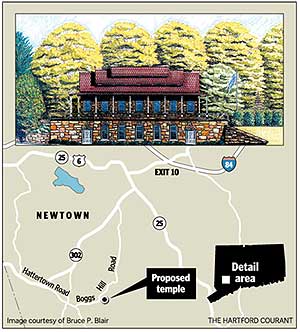BUDDHA IN SUBURBIA
July 24, 2008
Is Newtown clamping down on the religious freedom of a house of Cambodian monks or just enforcing its zoning laws?
Newtown, CT (USA) – This is what we know: There were more than 60 cars parked on a 10-acre property where four Cambodian Buddhist monks live in Newtown on April 13, the closest Sunday to the start of the Astrological New Year.

That’s what we know. This is what’s being debated: Did the Cambodian Buddhists converge there for a worship service, or to socially visit the monks—and is there any difference in the eyes of Newtown?
It’s the latest complicated clash between the town and the Buddhist Society of Connecticut, a group with nearly 400 members—mostly Cambodians who fled the Khmer Rouge in the ’70s and ’80s, and their children. In 1999, the society bought 10 acres on Boggs Hill Road. In 2001, it was denied a special exemption to hold services there. In 2003, the Planning and Zoning Board turned down its request to build a temple. The society took its case to the Connecticut Supreme Court earlier this year, and lost.
And here we are again, treading over constitutional territory. “Is it true that the law of the United States prohibits someone from going to a house to do something religious?” says Michael Zizka, attorney for the group. “We certainly say no.”
The complaints from April, which echo complaints the neighbors have made before, concerned the parking of cars. “Masses and masses of them,” says Richard Coburn, who lives two houses down. “And the noise that comes from all those cars.” But there is no regulation in Newtown about how many cars can be at a property at one time. The cease-and-desist order was solely related to the speculation that the place was being used as a house of worship.
Last week, the Zoning Board of Appeals considered the following questions: Is bowing to a statue of the Buddha when entering the house a religious act or just good etiquette? Is meditation necessarily a ritual of faith or “something we all do from time to time,” in the words of Zizka? Is it inherently religious to visit a monk on a holiday or is it like visiting Mom on her birthday, a social call to a valued person on an appropriate day?
These are not questions George Benson, director of Newtown’s Land Use Agency, likes to consider. “This is not a fun position to be in,” he says. “I think these are a peace-loving people, but we have a duty to uphold the zoning laws for the entire town.”
He says Frenette “put two and two together” and assumed cars gathered at a place owned by a religious group on a religious holiday were there for a religious event. “You have to think of the history of the property. They’ve had services in the past there. Is there any way we can know for sure that they were [in April]? We’d have to knock the door down and videotape them.”
Pinith Mar, vice president and spokesman for the group, says that no proper religious services occur at the house.
“Every time I go with my family to visit the monks, I am worried in the back of my mind that I am going to cause them trouble, that what I am doing will be seen as religious,” he says.
He says the cease-and-desist order (and its implications) would cut away the monks’ very role as monks. As it was in Cambodia and as it is in most societies with a large Buddhist population, “The monks have no job besides being monks. We count on them for advice and to know the Dharma, and they count on us for food and gifts for their livelihood.”
He says he’s looking for a more hospitable place for them and trying to teach them skills, such as speaking English and driving, so that they will be better integrated into society and that the religion may survive another generation locally.
But Mar says without the cars of the faithful pulling up to give them alms—religious service or not—”they are unemployed.”
By Nick Keppler
Source : Fairfield Weekly




